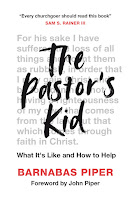This honest book about pastors kids (PKs) was recommended to us by one of our children. Barnabus Piper, son of John Piper (of Desiring God), has written about the unique challenges PKs face as the children of ministers. While he does talk about opportunities and positives, his purpose is really to explore the harder parts.
“The life of a PK is complex, occasionally messy, often frustrating, and sometimes downright maddening. It can be a curse and a bain. But being a PK can also be a profound blessing and provide wonderful grounding for a godly life. Often the greatest challenges are the greatest grounding, and the biggest falls are the best blessings.” (p.16)His premise is that “PKs face unique obstacles that create an environment that can lead to signification spiritual, identity, and lifestyle challenges.” (p26). He has three audiences in mind - PKs, pastors, and people in churches. So the focus changes at points, with specific attention given to each. He wants the PK to feel understood, and to truly know and love Jesus. He wants pastor parents to grasp the challenges their children may experience by virtue of them being in ministry. And he wants those in our churches to realise the expectations and pressures on PKs and how they might contribute to them.
Some pastors (and their wives) will find this hard reading. Some church members might think it’s too critical and misreads good intentions. Some might feel like his comments are overstated, or too negative, or too harsh. Or perhaps too simplistic and one-sided. At points it feels like it’s been written by an angry or disillusioned teenager still grappling with the issues, rather than someone who has been able to process and synthesise their experience from a broader perspective.
Yet, much of it rings true. Piper speaks of pain and misunderstanding that many PKs experience, which is worth hearing and exploring. He is honest about the challenges PKs face, how they want to be known, want to be allowed to be normal, and not to be assessed by who their parents are. In the end, all have a deep need to know the gospel of grace personally.
He notes that pastors and their wives are called to ministry, but their kids are dragged along for the ride. He exposes the fishbowl lifestyle where so many know about them, but do not truly know them. “Even the sheer number of people who greet the PK by name is constricting. It all adds up to a feeling of being watched.” (p.31)
He names assumptions that PK’s deal with: that they have a great relationship with God and their family, that they love the church, are confident in their faith and are leaders. This, combined with unrealistic expectations, can set many up for either false morality or a sense of failure:
“There is a straightforward, blunt, in-your face-expectation that PKs will behave better than our peers. We will have inherently better judgement, avoid temptations common to our age and gender, express none of our baser thoughts or feelings, and generally reflect positively on our parents and their position. Which is total nonsense.” (p.44)
“These three expectations - perfect angel, biblical superstar, and theological extraordinaire - are ingredients to a pressure that many PKs feel.” (p.48)Piper concludes that PKs need to know they are sinners in need of Jesus and grace: “Only in the person of Jesus is there power enough to free the PK to know who she is” (p.66). He spends a fair bit of time expanding on what grace will look like from the pastor parent to the PK. Pastor parents could find this both insightful and personally challenging. But those with humble hearts and a willingness to consider things from their kids’ perspective could come away with much to think about, and hopefully talk about with their wives and kids.
He finishes with encouragement about the blessings of being a PK - how they are raised in God’s word, how they see ministry up close, and how they have parents who love and serve Jesus. What was missing was the acknowledgement of the positive aspects of being known by many: you are also loved, cared for, helped, and prayed for by many in the church. You are more likely to be mentored by young adults, and church members are more likely to invest time in you. You are not likely to be a youth who falls through the cracks or doesn't get followed up.
This is thought-provoking reading for pastors who are parents (noting it is really about dad being the full-time minister). It could be helpful for PKs (teenagers and older) who want to read something that relates to their own experience, although it would be a shame if it led to further bitterness. As for those in our churches - it’s useful for everyone - but perhaps specifically those who minister to PKs - be they children’s or youth group leaders.
We all need to hear the gospel of grace, but Piper suggests that some PKs need to hear it a little more strongly. If this is a way to assist with that through understanding or conversations, he has done PKs a good service.






